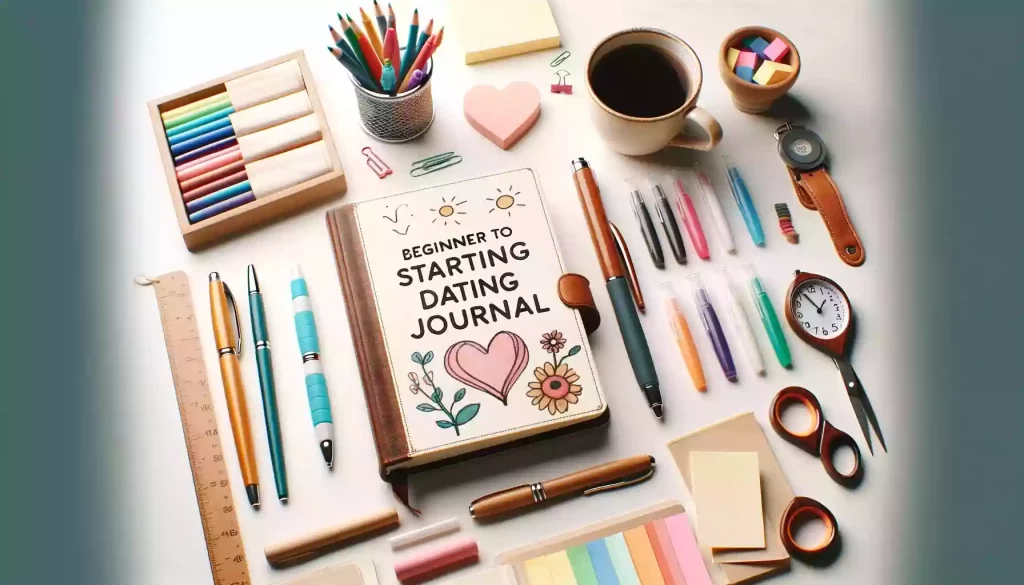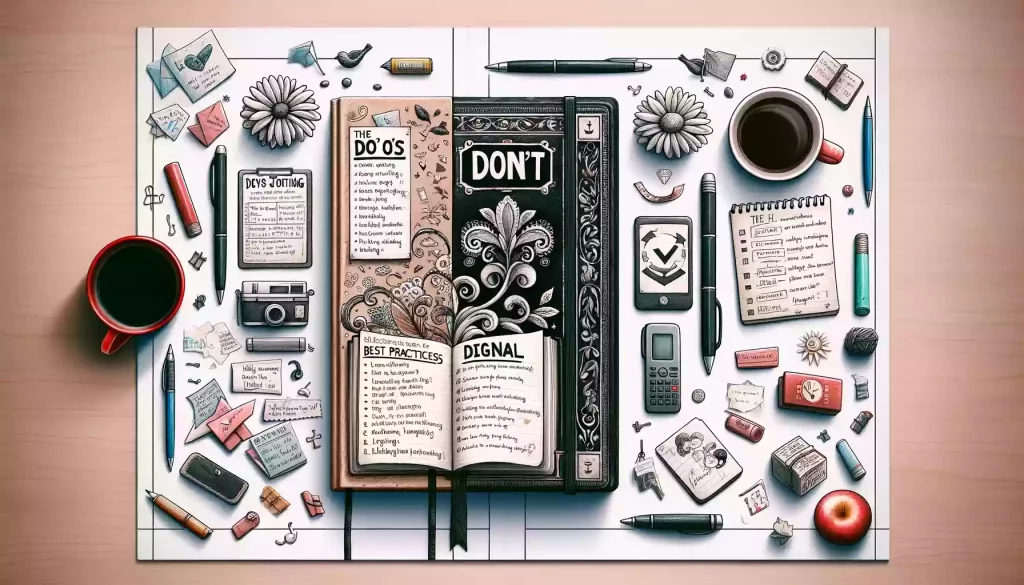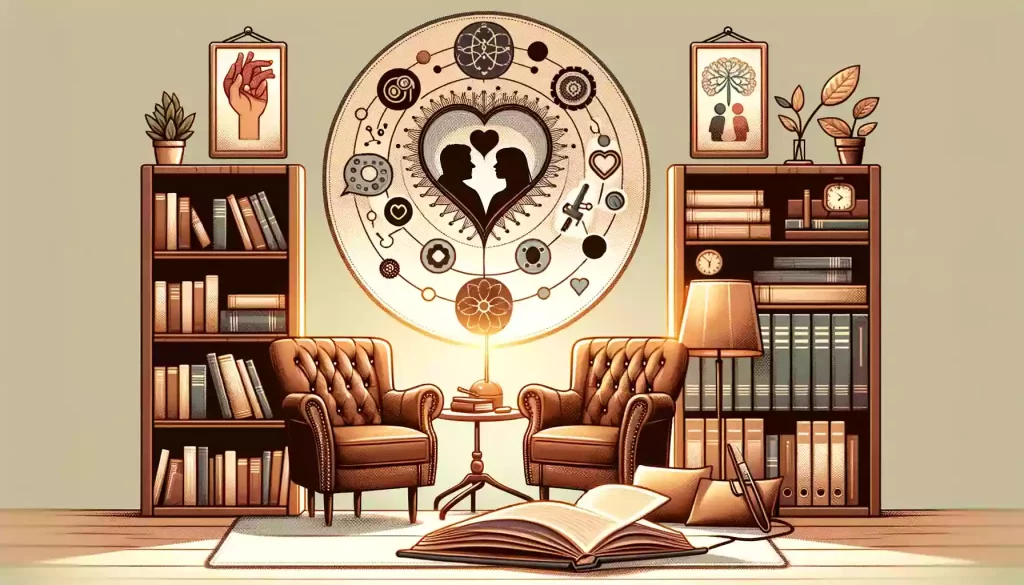The Power of a Dating Journal
Have you ever considered the transformative power of maintaining a dating journal? In a world where we're constantly searching for meaningful connections, a dating journal serves as a unique tool for self-discovery and reflection. It's more than just a record of dates and encounters; it's a window into your emotional world and a guide to understanding your relationship patterns.
Throughout this article, we will explore the multifaceted benefits of keeping a dating journal. Whether you're a seasoned journaler or new to the concept, you'll find valuable insights and practical tips to enhance your dating experience.
Let's dive into the world of dating journaling and uncover the secrets it holds about our romantic lives. From recognizing patterns in your relationships to setting future goals, your dating journal is a treasure trove of personal insights.
But before we delve deeper, let's look at some key takeaways you can expect from this article.
Key Takeaways:
- Understanding the importance and benefits of keeping a dating journal.
- Practical tips for starting and maintaining a meaningful dating journal.
- How to analyze and learn from your dating patterns and experiences.
- Using your journal to set goals and intentions for future relationships.
- Insights from experts on the psychological benefits of dating journaling.
How to Start Your Dating Journal: Tips for Beginners

Embarking on the journey of keeping a dating journal can be both exciting and a bit daunting. However, with some simple steps, you can easily start your journal and make it a meaningful part of your dating life. Here are some beginner-friendly tips to help you get started.
1. Choosing Your Journal: The first step is to choose a journal that resonates with you. Whether it's a beautifully bound book or a simple notebook, what matters most is that it feels right for you. Consider the size, type of paper, and overall design – your journal should be something you're drawn to write in.
2. Setting a Routine: Consistency is key. Decide on a regular time to update your journal, whether it's after each date or at the end of the week. This habit will help you keep a comprehensive record of your dating experiences.
3. Writing Prompts: Sometimes, starting with a blank page can be intimidating. Use writing prompts to get the ball rolling. Questions like 'How did I feel about this date?' or 'What did I learn about myself?' can be great starters.
4. Be Honest and Reflective: Your journal is a private space. Be as honest and reflective as you can about your feelings, experiences, and expectations. This honesty will be invaluable in helping you understand yourself better.
5. Include the Good and the Bad: It's important to journal about both positive and negative experiences. This will give you a balanced view of your dating journey and help you learn from each experience.
6. Review Regularly: Periodically look back on your entries. This can provide insights into patterns and growth over time. Reflecting on past entries can be incredibly revealing and helpful.
7. Personalize Your Journal: Make your journal uniquely yours. Add photos, ticket stubs from dates, or other memorabilia. This personal touch will make your journal more enjoyable and special.
Decoding Your Dating Patterns: What Your Journal Says
Once you've started your dating journal, it becomes a powerful tool for understanding your dating habits and preferences. Decoding the patterns in your journal can help you make more informed decisions in your dating life. Let's explore how your journal can reveal these patterns.
1. Identifying Repetitive Behaviors: Look for recurring themes or behaviors in your entries. Are you often attracted to a certain type of person? Do similar issues arise in different relationships? Recognizing these patterns is the first step in understanding them.
2. Emotional Trends: Pay attention to how you describe your emotions in different situations. Are there certain types of dates that consistently make you happy or upset? This can help you understand what you truly seek in a relationship.
3. Learning from Past Mistakes: Your journal can help you identify mistakes you've made in past relationships. Understanding these can prevent you from repeating them in the future.
4. Recognizing Growth: Over time, your journal will show how you've grown and changed in your approach to dating. Celebrate this growth – it's a sign of your evolving understanding of yourself and relationships.
5. Clarifying What You Want: By regularly journaling, you'll begin to see more clearly what you're looking for in a partner and a relationship. This clarity is crucial for future dating success.
6. Seeking Professional Advice: If you notice troubling patterns, don't hesitate to seek advice from a therapist or counselor. Sometimes, an expert perspective can be very helpful.
7. Using Insights for Future Dates: Finally, use the insights you've gained from your journal to inform your choices in future dates. This proactive approach can lead to more fulfilling and meaningful relationships.
Emotional Reflection: Understanding Your Feelings

One of the most profound benefits of keeping a dating journal is the opportunity for emotional reflection. It allows you to process your feelings in a healthy, constructive way. Understanding your emotions is not just about deciphering how you feel about a particular date or person, but it's also about understanding yourself better.
1. Recognizing Your Emotional Patterns: As you record your dating experiences, you'll start to notice patterns in your emotional responses. Do certain behaviors or situations trigger specific emotions? Understanding these patterns is crucial for personal growth.
2. Processing Emotions: Writing in your journal gives you a chance to process your emotions, rather than just experiencing them. This can lead to deeper insights and a more balanced perspective on your dating experiences.
3. Identifying Your Needs and Boundaries: Reflecting on your feelings helps you understand what you need and want in a relationship. It also helps in setting healthy boundaries, an essential aspect of any relationship.
4. Learning from Disappointments: Not all dating experiences are positive, but even disappointments offer valuable lessons. Your journal can help you learn from these experiences and move forward with new understanding.
5. Celebrating Positive Experiences: Just as it's important to reflect on challenges, it's also crucial to celebrate the positive experiences. This helps build a sense of gratitude and positivity in your dating journey.
6. Cultivating Self-Compassion: As you reflect on your emotions, it's important to practice self-compassion. Be kind to yourself, especially when confronting difficult feelings or experiences.
Setting Goals: Using Your Journal for Future Relationships
Your dating journal isn't just a record of the past; it's also a tool for shaping your future. By setting goals based on your journal reflections, you can guide your dating journey in a more intentional and fulfilling direction.
1. Clarifying What You Want: Use your journal to get clear on what you really want in a partner and a relationship. Writing down your desires can help manifest them into reality.
2. Identifying Non-Negotiables: Through your journaling, you'll learn about traits and behaviors that you cannot accept in a partner. Identifying these non-negotiables is crucial for healthy relationship choices.
3. Setting Relationship Goals: Whether it's improving communication, being more open to different types of people, or taking things slowly, use your journal to set specific relationship goals.
4. Tracking Progress: Regularly review your journal entries to track your progress towards your goals. This can be incredibly motivating and rewarding.
5. Adjusting Goals as Needed: As you grow and change, so will your goals. Allow your journal to reflect these changes and adjust your goals accordingly.
6. Using Insights for Future Relationships: Finally, apply the insights and lessons learned from your journal to your future relationships. This proactive approach can help you build more meaningful and satisfying connections.
Privacy and Discretion: Keeping Your Journal Safe
Your dating journal is a personal and intimate record of your feelings and experiences. As such, it's essential to keep it private and secure. Here are some tips to ensure the privacy and discretion of your journal.
1. Choosing a Secure Location: Keep your journal in a safe, private place where others won't accidentally stumble upon it. Whether it's a locked drawer or a private shelf, make sure it's a place only you can access.
2. Consider a Journal with a Lock: For added security, you might want to choose a journal that comes with a lock. This physical barrier can provide peace of mind and ensure your entries remain private.
3. Digital Privacy: If you're using a digital journal, make sure to use strong passwords and possibly encryption to protect your entries. Be cautious about cloud storage and understand the privacy policies of any apps or platforms you use.
4. Discretion in Sharing: While sharing some insights from your journal with close friends or a therapist can be beneficial, always be selective and conscious of what and with whom you share.
5. Destroying Old Entries: If you decide to dispose of old journals or entries, do so securely. Shredding paper journals or securely deleting digital entries ensures that your personal information remains private.
Creative Ideas to Enhance Your Dating Journal Experience
Your dating journal can be more than just a record of dates and feelings; it can be a creative outlet that enriches your dating experience. Here are some ideas to add a creative twist to your journaling practice.
1. Visual Elements: Incorporate visual elements like sketches, photos from dates, or even ticket stubs. This not only makes your journal more interesting but also helps in capturing the essence of each experience.
2. Creative Writing: Try different writing styles like poetry, haikus, or even fictionalized versions of your dates. This can add an element of fun and creativity to your journaling.
3. Reflective Exercises: Include exercises like gratitude lists or future letter writing to yourself. These can provide different perspectives and deeper insights into your dating journey.
4. Themed Entries: Create themed entries such as 'lessons learned' or 'moments of joy'. This can help in organizing your thoughts and reflecting on specific aspects of your experiences.
5. Interactive Elements: Consider adding interactive elements like fold-out pages, pockets for memorabilia, or even spaces for future reflections. These can make your journal a dynamic and engaging tool.
The Do's and Don'ts of Dating Journaling

Dating journaling can be an enriching experience, but it's important to approach it with some guidelines in mind. Here are some essential do's and don'ts to help you make the most of your dating journal.
1. Do: Be Honest and Reflective: Your journal is a space for honesty. Reflect deeply on your experiences and emotions without sugarcoating them.
2. Don't: Overanalyze Every Detail: While it's important to reflect, avoid overanalyzing every single detail of your dates. This can lead to unnecessary stress and confusion.
3. Do: Keep It Regular: Regular entries help you track your progress and patterns. Try to write in your journal consistently, even if it's just a few lines.
4. Don't: Ignore Red Flags: If you notice patterns or behaviors that concern you, don't ignore them. Your journal can help you recognize and address these red flags.
5. Do: Use It as a Tool for Growth: Ultimately, your journal should be a tool for personal growth and understanding. Use it to learn about yourself and what you want in relationships.
Technology Meets Tradition: Digital vs. Paper Journals
In the age of technology, dating journaling has evolved to include both digital and traditional paper journals. Each format has its unique advantages and drawbacks. Let's explore the differences and see what might work best for you.
1. Digital Journals: Digital journals are convenient and easily accessible. They offer features like password protection, easy editing, and the ability to include digital content like photos or links. However, they lack the tactile experience of paper journals and may pose privacy concerns if not properly secured.
2. Paper Journals: Paper journals offer a tactile and personal experience. Writing by hand can be therapeutic and offers a break from screen time. However, they lack the convenience of digital journals, like easy editing and backup options.
3. Privacy and Security: Digital journals can be encrypted and password-protected, offering high levels of security. Paper journals, on the other hand, require physical security measures like a lock or a safe place to store them.
4. Accessibility and Portability: Digital journals can be accessed from anywhere, making them highly portable. Paper journals are tangible and can be carried around, but they can't be accessed remotely.
5. Personal Preference: Ultimately, the choice between digital and paper journals comes down to personal preference. Consider your lifestyle, privacy concerns, and how you enjoy journaling to make the best choice for you.
Expert Insights: Therapists' Take on Dating Journals

Many therapists endorse the practice of keeping a dating journal for its therapeutic benefits. Let's explore what experts in psychology and relationship counseling have to say about the role of dating journals in personal growth and relationship dynamics.
1. Enhancing Self-Awareness: Therapists often highlight that dating journals can significantly enhance self-awareness. By reflecting on your dating experiences and emotions, you gain deeper insights into your own behaviors and preferences.
2. Facilitating Emotional Processing: Writing about your dating experiences can be a form of emotional processing, helping you understand and manage your feelings more effectively, therapists suggest.
3. Identifying Patterns: Therapists note that journals are useful for identifying patterns in relationships. Understanding these patterns can lead to healthier relationship choices and behaviors.
4. Aiding in Therapy: A dating journal can be a valuable tool in therapy. It provides therapists with a concrete way to understand your experiences and can guide discussions during sessions.
5. Promoting Mental Health: Therapists agree that dating journals can promote better mental health by providing a space for reflection, understanding, and personal growth.
FAQ: Common Questions About Keeping a Dating Journal
Keeping a dating journal is a unique experience and can raise various questions. Here, we address some of the most common queries to help you get the most out of your journaling journey.
1. How often should I write in my dating journal? Write as often as you feel necessary. Regular entries can provide more insights, but even sporadic entries are valuable.
2. What should I write about in my journal? Write about your feelings, experiences, reflections, and anything else that feels significant to your dating journey.
3. Can a dating journal really help me in my relationships? Yes, it can help by providing insights into your patterns, preferences, and emotional responses, which can inform your future relationship choices.
4. Should I keep my journal private? Yes, maintaining privacy is usually recommended to ensure that you can be as honest and open as possible in your entries.
5. Can I use a digital journal instead of a paper one? Absolutely. Choose the format that you are most comfortable with, as both have their own advantages.
6. What if I find negative patterns in my journal? Recognizing negative patterns is a crucial step in personal growth. Consider discussing them with a therapist or counselor for further insights.
Concluding Thoughts: The Journey of Self-Discovery

As we draw this article to a close, it's important to reflect on the journey of keeping a dating journal as a profound path of self-discovery. It's more than just a record of who you've met or dated; it's a tool for personal growth and emotional understanding.
1. Embracing the Journey: Your dating journal is a chronicle of your personal journey. Embrace it fully, with all its ups and downs, as a part of your growth.
2. Finding Clarity: Through your entries, you'll find clarity in your thoughts and feelings, helping you make better decisions not just in dating, but in life.
3. Discovering Yourself: One of the greatest gifts of journaling is the discovery of your own self – your desires, fears, strengths, and areas for improvement.
4. Growing through Reflection: Regular reflection in your journal allows for continuous personal growth and emotional development.
5. Valuing Experiences: Every entry, whether joyful or challenging, is valuable. Your journal helps you appreciate and learn from each experience.
6. Moving Forward: As you continue on your journey, your journal will serve as a faithful companion, guiding and informing your path forward.
Further Resources: Books and Websites to Explore
While this article provides a comprehensive overview of dating journaling, there are many more resources available for those who wish to delve deeper. Here are some books and websites that can offer additional insights and guidance.
1. Recommended Books: Look for books on personal growth, emotional intelligence, and relationships. Titles like 'The Art of Dating' and 'Journaling for Self-Discovery' can be particularly enlightening.
2. Online Resources: There are numerous websites and blogs dedicated to journaling and personal development. Sites like 'Mindful Journaling' and 'Relationship Reflections' offer great tips and insights.
3. Community Forums: Online forums and communities can be a great place to share experiences and get advice from others who are also journaling their dating experiences.
4. Workshops and Webinars: Keep an eye out for workshops or webinars on journaling, personal growth, and relationships. These can provide valuable learning opportunities and a chance to connect with like-minded individuals.


.jpg.1626fbc48c04fd9021fd315819807524.thumb.jpg.882936eb5901fa05cf31c75617acde2e.jpg)

Recommended Comments
There are no comments to display.
Create an account or sign in to comment
You need to be a member in order to leave a comment
Create an account
Sign up for a new account in our community. It's easy!
Register a new accountSign in
Already have an account? Sign in here.
Sign In Now